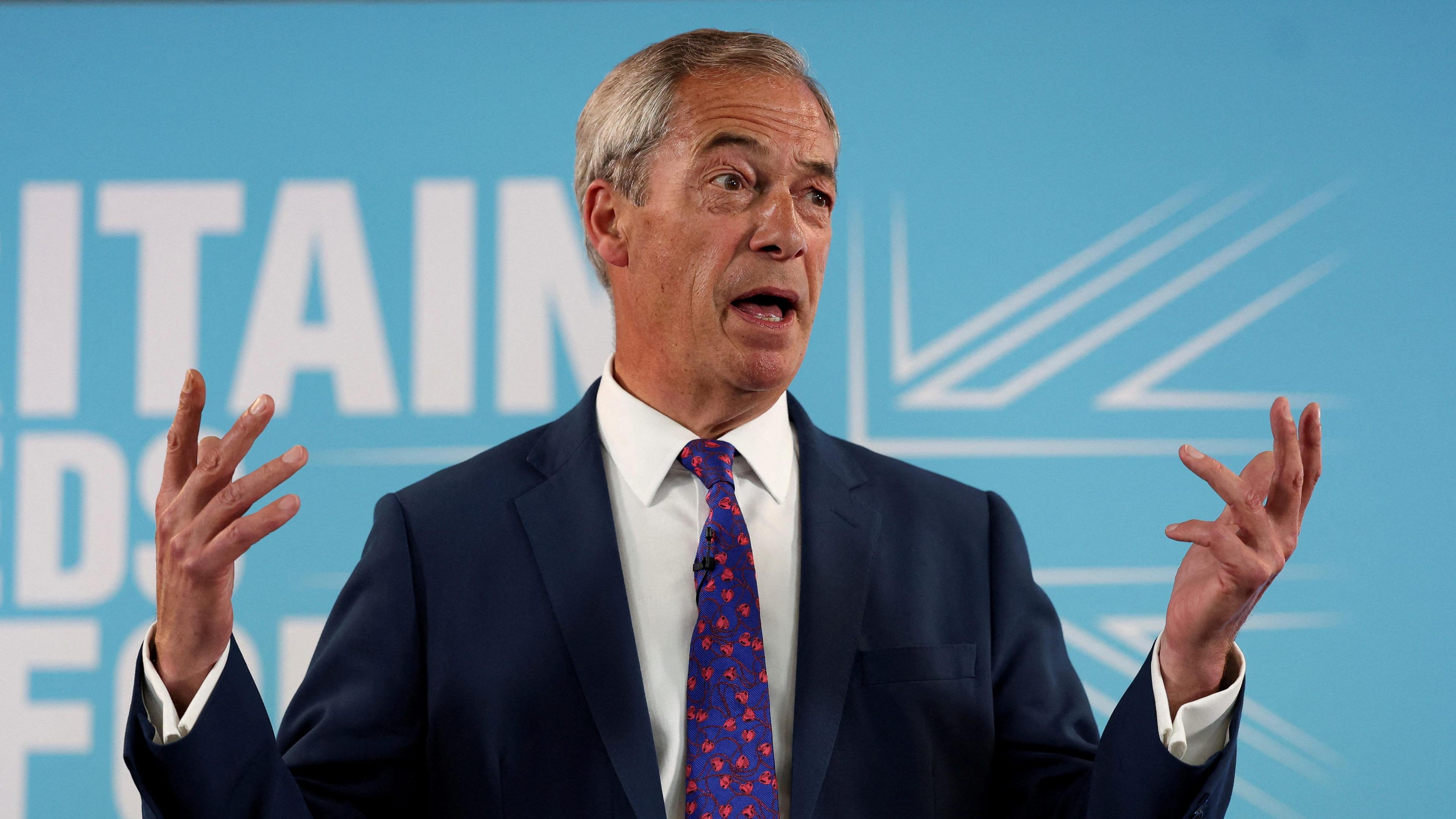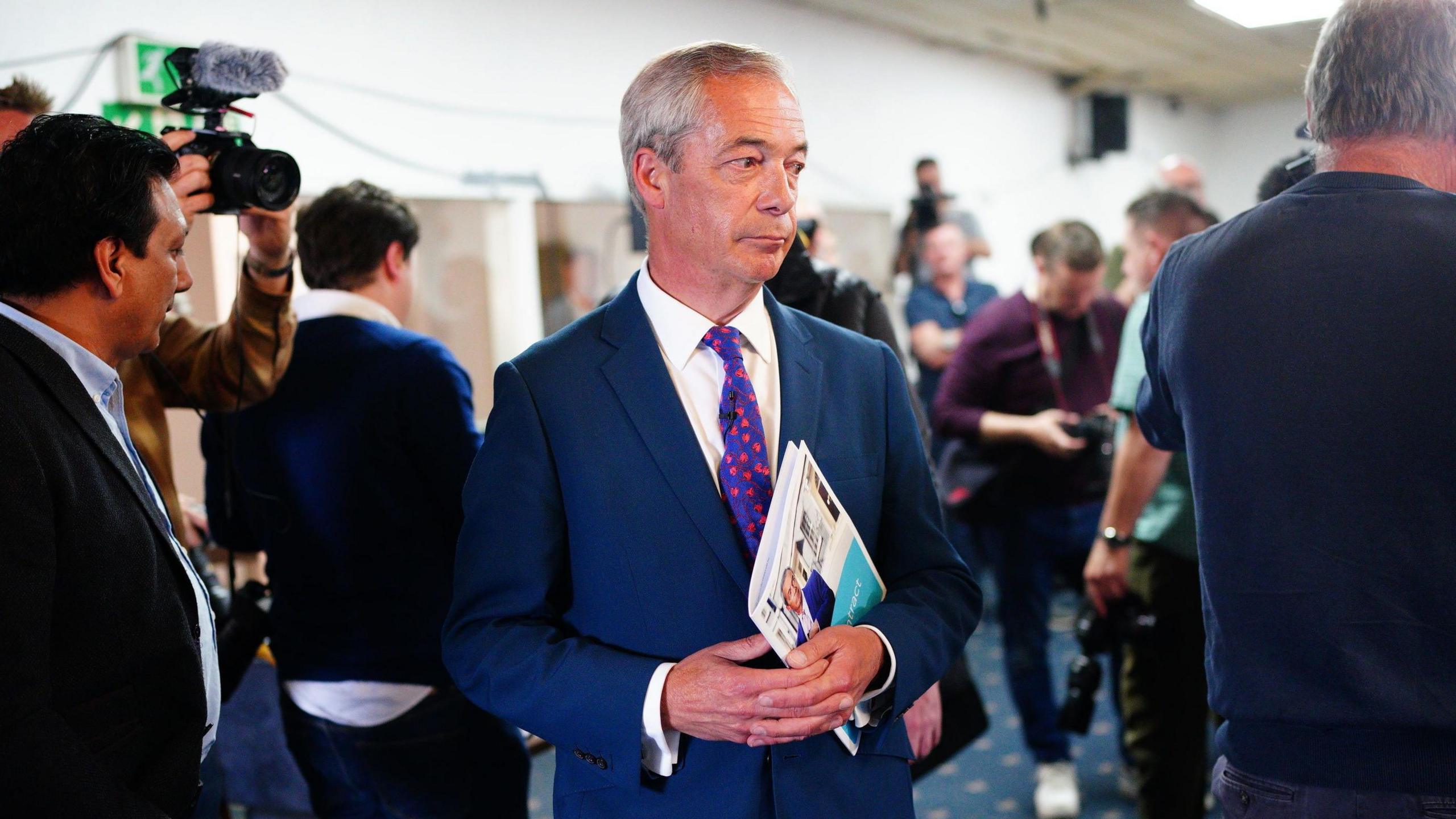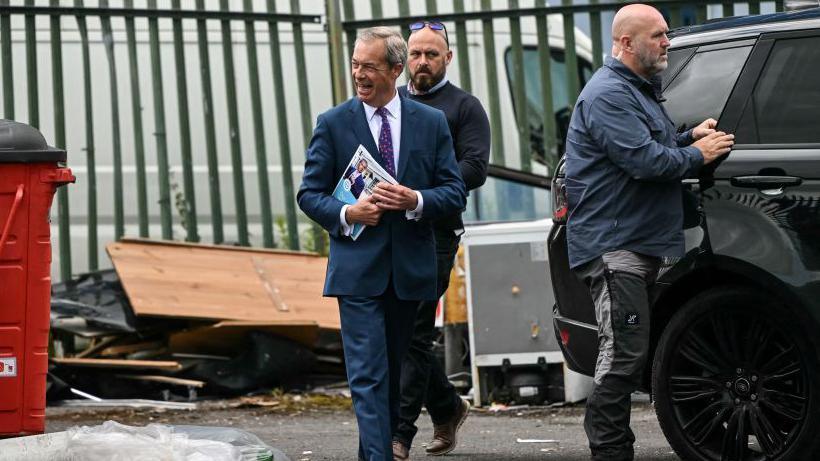Farage: Wales shows what a Labour government will do

Nigel Farage launched his party's equivalent of a manifesto in Merthyr Tydfil on Monday
- Published
Wales shows what happens to a country when Labour is in charge, Nigel Farage has said as he launched his party's version of a general election manifesto.
Reform UK launched its "contract" with voters in Merthyr Tydfil on Monday - Mr Farage said he chose the location because he said Wales had been been "let down" by its Labour government in Cardiff.
The party's priorities across the UK include a freeze on non-essential immigration, cuts to income tax and higher defence spending.
Welsh Labour said Reform were a "band of chancers seeking to sow division", while the Welsh Conservatives said they had a "strong record in standing up to Labour".
Reform was known as the Brexit party until 2021. Former Brexit party Senedd politician Caroline Jones is among those standing for the party.
Are people betting on the general election?
- Published26 June 2024
How to take part in the BBC Wales Election Debate
- Published14 June 2024
Starmer's plan to replace EU fund 'positive' - FM
- Published15 June 2024
Ahead of the launch Mr Farage said: "One of the reasons we are launching our contract with the people of Britain in Wales is because it shows everyone exactly what happens to a country when Labour is in charge."
"Since devolution, the Welsh have been ignored by the London political establishment and let down by the Labour administration they elected," he claimed.
"Meanwhile, the Tories have been the official opposition almost solidly since 2016 and have achieved zilch, which probably explains why we are neck-and-neck with them in the polls in Wales.
"So, if you want a picture of what the whole country will be like with a Starmer government and a feeble Conservative opposition, come to Wales."
With the party's opinion poll ratings improving, its leader is staking a claim to being the opposition to Labour across the UK, with stopping some immigration a key focus.

Nigel Farage argued the "contract" was not a manifesto
Mr Farage launched Reform's "Our Contract with You" at a community centre in Gurnos.
He said waiting times in Wales were higher than in England, and that education had drifted "rapidly in a leftward, PC, woke direction" while falling behind schools across the border.
He claimed the Labour government in Wales "reduces your freedoms, reduces your choices," and "ends Right to Buy".
Reform's contract says the UK should leave the European Convention on Human Rights, freeze non-essential immigration and stop Channel crossings by removing migrants from boats and returning them to France.
Workers would be allowed to earn £20,000 before starting to pay any income tax and there would also be tax relief for those taking out private health insurance instead of using the NHS.
The charter sets out how this could be paid for by axing chunks from the welfare bill, scrapping net-zero targets and reducing the cost of government by 5%, as well as scrapping the planned HS2 link between London and Birmingham.
Other policies include abolishing stamp duty, and abolishing inheritance tax for all estates under £2m.
Mr Farage said at the launch event: "We are going through a breakdown of trust in politics where manifestos - one after another - keep making the same promises and no one believes now, frankly, a word that they say.
"Which is why today, specifically, is not a manifesto launch."

The launch took place at a community centre in Gurnos
The Institute for Fiscal Studies (IFS) said Reform proposes tax cuts that would cost nearly £90bn a year, and spending increases of £50bn a year. The party claims it would pay for those through £150bn a year in reductions in other spending.
Carl Emmerson, IFS deputy director, said this would "represent a big cut to the size of the state".
"Regardless of the pros and cons of shrinking the state, or of any of their specific measures, the package as a whole is problematic," he said.
"Spending reductions would save less than stated, and the tax cuts would cost more than stated, by a margin of tens of billions of pounds per year."
Analysis
By Daniel Davies, political correspondent
Visiting south Wales returns Nigel Farage to the scene of an earlier political success.
Merthyr Tydfil is in a Senedd electoral region where his old party, UKIP, won two seats in 2016. Across the whole of Wales it won seven.
That was under the Senedd’s partly-proportional electoral system. Winning under the Westminster system is far more difficult.
But some in Reform UK have set their sights on the next Senedd election in 2026.
With Mr Farage at the helm, they hope to repeat the success of his old party ten years earlier.
'Not welcome'
Jessica Morden, Welsh Labour's campaign chair, said: "Nigel Farage's brand of divisive politics is not welcome here in Wales.
"Wales has a proud history of being an inclusive society, and Reform's band of chancers seeking to sow division will find little succour.
"It's no wonder that all of Farage's party were turfed out of the Welsh Parliament at the last election."
A Welsh Conservative Senedd spokesman said the party had a "strong record in standing up to Labour on immigration", citing its opposition to the Welsh government's decision to allow asylum seekers leaving care to take part in the two year basic income pilot.
He added: "Labour has repeatedly shown their true colours on immigration, and a vote for Reform will allow Labour into Downing Street.
"The only way to see a tough approach on immigration is to vote for the Welsh Conservatives."
A Plaid Cymru spokesperson said: "For Nigel Farage, Wales is nothing but a prop to boost his own ego.
"He has sold lies to people in post-industrial areas in the past and will do so again tomorrow.
"Reform will blame all of Wales' ills on immigration, but what areas like Merthyr Tydfil need is investment and jobs, not Nigel Farage's divisive agenda."
The Brexit Party briefly had a group of Members of the Senedd in the Welsh Parliament – made up of former UKIP politicians elected in 2016.
It failed to win seats at the Senedd election in 2021 but has discussed making a fresh bid for Welsh Parliament in two years' time.
Wales voted to leave the European Union at the European Union referendum in 2016, and elected seven Senedd members from Mr Farage’s former party UKIP the same year.
Additional reporting by PA Media.

The candidates in Merthyr Tydfil and Aberdare are:
Anthony Cole, Workers Party of Britain
Bob Davenport, Communist Party of Britain
David Griffin, Green
Amanda Jenner, Conservative
Gerald Jones, Labour
Jade Smith, Liberal Democrats
Gareth Thomas, Reform UK
Francis Whitefoot, Plaid Cymru
Lorenzo de Gregori, Independent